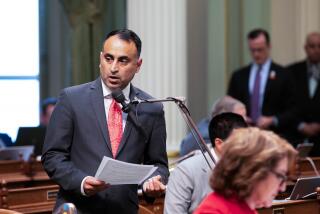Universal Means 95%? Sheer Doublespeak : Health coverage: True reform is jeopardized by cynical manipulation and phony claims about incremental reform.
- Share via
The health care debate got another jolt this week when President Clinton, who has consistently called for universal health coverage, told the nation’s governors that “something in the ballpark of 95%” coverage would be acceptable to him. The opponents of comprehensive reform seized upon his remarks with glee, despite Clinton’s swift clarification that he still backs universal coverage.
As Congress hurtles, or stumbles, toward the last phase of this extraordinary debate, misrepresentations by these opponents are jeopardizing a historic chance to achieve in the United States what already has been secured in all other advanced industrialized nations: a universal assurance of health coverage.
The first canard has to do with the very definition of “universal coverage.” Most people not actually in Congress would naturally assume that the phrase means what it says: Everybody would have health insurance guaranteed. But now “universal” is being redefined to mean 95% or even less. Try explaining that to the 15 million Americans who would go without insurance, or to the businesses and workers whose insurance premiums would continue to reflect the cost of providing costly emergency care to the uninsured.
For both humane and practical reasons, “universal” ought to mean all of us. But our argument is not that legislation aimed at the goal of universal coverage will fully achieve it--that every last American will in fact obtain health insurance. As with all laws that define a universal obligation, compliance will not be universal (and this may be the point that the President intended to make). That is why we enforce laws--because not everyone abides by them. But when we collectively decide what all Americans ought to do or not do, we seek to get as close as possible to universal compliance.
The second canard comes from lawmakers and others who claim that through incremental reform--including reform of insurance practices, changes in malpractice rules, paperwork reduction and other relatively less controversial and ambitious measures--we could assure health coverage for 91% of Americans, up from the 85% who have some coverage now. Citing the Congressional Budget Office as authority, they argue that if we can achieve (ostensibly) only 95% coverage with difficult, politically controversial steps, but can hit 91% with easy legislation, we should not anguish over the differential.
What these advocates of incrementalism conveniently manage to overlook is that the CBO report they refer to did not actually say that incremental reform would cover 91% of the population. It said that the bill introduced by Sen. John Breaux (D-La.) and Rep. Jim Cooper (D-Tenn.) would produce that level of coverage only if it was fortified with another $300 billion in revenues. (And the Cooper-Breaux bill was more ambitious than some of the other incremental proposals for which proponents now claim the 91% figure.) The budget office did not specify how far short of 91% the Cooper-Breaux bill would fall without a huge infusion of funding, but it certainly never declared that any of the incremental bills under consideration by Congress would yield 91% coverage.
There is still time, as bills head from congressional committees to the floors of the House and Senate, to have a serious and constructive debate about whether and how to achieve universal health coverage. For that to happen, however, the parties to the debate will have to be candid with each other and with the public. The proponents of universal coverage ought to concede that it comes with a price tag--that just as there is no free lunch, so there is no free medical care. But they should also emphasize that if universal insurance is coupled with real restraints on the escalation of health care costs, savings will soon far exceed the upfront costs of expanding insurance. Those who advocate more modest reforms ought to concede that they are not aiming at universal coverage by any reasonable definition and that even their less inclusive proposals require substantial funding to achieve what they promise.
As the debate focuses on options to increase the number of Americans with coverage, cost control has fallen victim to political amnesia. Insisting that lawmakers and media commentators avoid doublespeak is important. But equally important is the understanding that wise policy requires realistic debate about cost. That in turn requires that we understand the essential link between universal coverage and effective cost control.
Candor about costs is especially crucial. If medical costs continue to increase more rapidly than our incomes, the funds required to subsidize the uninsured will rise, not fall, and any effort to expand coverage will become harder over time, not easier. The stakes in health reform--for people and the economy--are difficult to overstate. But if we continue to tolerate false characterizations and phony claims, we will get either inadequate health reform or none at all.
More to Read
Sign up for Essential California
The most important California stories and recommendations in your inbox every morning.
You may occasionally receive promotional content from the Los Angeles Times.













